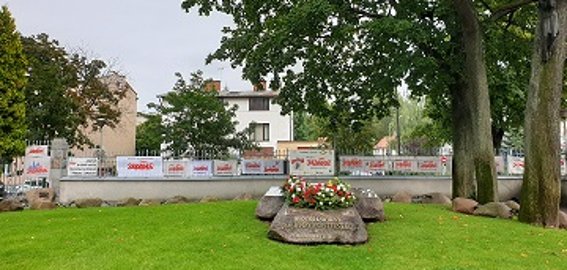On 19 October 1984, the Roman Catholic priest Jerzy Popieluszko was murdered by the Polish communist state security service at the age of 37. The young parish priest, responsible for the St Stanisław Kostka parish in Warsaw, where numerous opposition civil rights activists came together, openly and with great commitment opposed the communist regime in Poland at the time. He sharply criticised the martial law imposed in 1981 and the final ban on the trade union Solidarność by a new trade union law in October 1982. Popieluszko paid for his stance, his active support for the opponents of the regime and the strike movement and ultimately his unreserved commitment to the people and their basic right to live in dignity with his life.
District Administrator Dr Theophil Gallo, Chairman of the German-Polish Society Saar
e. V., together with his Polish counterpart Adam Krzyszton from the partner district of Lancut, Andreas Motsch, Head of Central Management, Security and Order, Dr Violetta Frys, Head of the Europe Unit, and Beate Hussong, Youth Work Officer, visited Popieluszko's former home in Warsaw in 2020, which now serves as a memorial site. The "Museum of the Martyrdom of the Blessed Priest Jerzy Popieluszko", which was established for posterity in 2015 in Wloclawek, around 140 kilometres north-west of the Polish capital, is also dedicated to the moving life of the resistance fighter. This is because Jerzy Popieluszko was beatified as a martyr by Pope Benedict XVI in 2010.
District Administrator Dr Theophil Gallo takes the 40th anniversary of the pastor's death as an opportunity to remember the work and fate of Jerzy Popieluszko: "Jerzy Popieluszko certainly stands for countless people worldwide who had to die in resistance against an inhumane ruling state power. He was the victim of spying, threats and interrogations until his murder by officers of the state security service. This is just one example of the brutality of the so-called security apparatus in the former People's Republic of Poland. It is remarkable that 800,000 people attended Popieluszko's funeral, which was seen as a demonstration against the communist state power. Last but not least, the speedy investigation into the murder of the Catholic opposition figure contributed to the end of the communist regime, to the change in the system."
Information on the district partnerships and the European work of the Saarpfalz district can be obtained from Dr Violetta Frys, European Affairs Officer and Head of the Europe Unit, by calling (06841) 104-8273 or sending an e-mail to [email protected] or [email protected].
